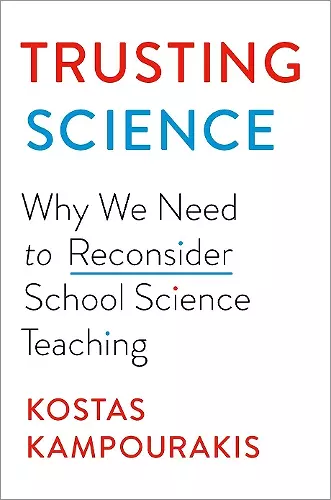Trusting Science
Why We Need to Reconsider School Science Teaching
Format:Hardback
Publisher:Oxford University Press Inc
Published:16th Aug '25
Should be back in stock very soon

In today's world of social media and information overload, certain science topics related to policy decisions, such as vaccination, ignite controversy. Beyond the usual explanations of science denial and ideological battles lies a deeper issue: a widespread distrust fueled by poor science communication. Trusting Science: Why We Need to Reconsider School Science Teaching reveals how a lack of understanding of how science is done can result in distrust among those who aren't inherently against science. This book highlights the urgent need for better public education on how science truly works-from gathering evidence and understanding uncertainties to recognizing the role of experts and even the biases scientists may have. Drawing on historical and contemporary socio-scientific controversies, particularly - but not only - in the realm of vaccination, Dr. Kostas Kampourakis offers insightful solutions to bridge the gap between scientists and the public. By enhancing communication and education, he argues, we can foster a more realistic and appreciative view of science, recognizing both its immense potential and its limitations. Trusting Science is a must-read for anyone interested in better understanding science and in the future of public trust in science.
In a climate where distrust and misunderstanding of, and misinformation about, science threatens our ability to respond effectively to urgent social, technological and medical crises, this book is sorely needed.Trusting Scienceis a clear and balanced guide that should help anyone make informed decisions about new and perhaps controversial or contested scientific claims, as well as guiding policymakers toward ways of maintaining public trust in science which, for all its flaws and uncertainties, is still the best system we have for developing reliable knowledge about the natural world. * Philip Ball, science writer and author of How Life Works *
Trusting Science is designed to help readers make both personal and societal decisions that are based on the best science. How to sort through all the confusing claims that only pretend to be based on science, including the many "conspiracy theories" that permeate the internet? Using a series of historical examples, Kampourakis carefully explains the difference between what science can and cannot do, and how societal decisions often depend on questions that science cannot answer. Throughout, he also stresses that there are many important concepts related to how science is done that are never taught in school but must be taught if adults are to decide what science to trust. The entire book can be viewed as preparation for its final, and most important figure: an invaluable personal "decision tree" about when to trust scientific claims. * Bruce Alberts, Chancellors Leadership Chair in Biochemistry and Biophysics for Science and Education, University of California, San Francisco *
In Trusting Science, Kostas Kampourakis examines the roots of science skepticism and proposes educational solutions. He usefully draws from historical and contemporary examples, particularly in vaccination, to offer valuable insights into scientific processes, limitations, and the importance of trusting scientific consensus. Kampourakis makes a much-needed call to reform science education to focus on the philosophy and sociology of science rather than on the mere memorization of scientific facts.The book's focus on practical applications will make it valuable for every citizen as well as for educators, policymakers, and everyone who is interested in the important role science plays in society. * Mark Navin, Professor and Chair of Philosophy, Oakland University and author of Americas New Vaccine Wars *
Kostas Kampourakis is one of the most important scholars in the world exploring and critiquing the ways that various publics encounter science. His excellent Trusting Science is another triumph. Kampourakis offers here a compelling and insightful treatment that all teachers, as well as all citizens who care about getting the teaching of science right, should read. * Robert D. Johnston, Professor of History, University of Illinois Chicago *
In today's world the rising tide of science misinformation and mistrust threatens to drown us all—with disastrous consequences for society. In this brilliant new book, Kampourakis offers a fresh way to think about what science is and why it can be relied on to make decisions about our lives. Essential reading for science educators, policymakers, and anyone who cares about safeguarding our future. * John L. Rudolph, Vilas Distinguished Professor, University of Wisconsin-Madison and author of Why We Teach Science (and Why We Should) *
There is a deep distrust of the findings of science and the reports of scientists—especially when it comes to things like climate change and vaccines. Trusting Science is a much-needed correction to the overdosing of science skepticism prevalent today. In this book Kostas Kampourakis skillfully explores the underlying causes of much skepticism about science. He not only tracks the historical development of science skepticism of various sorts, but he also examines the causes with an even hand noting where some skepticism is indeed warranted and where it is unfounded. Trusting Science offers readers a chance to better understand why there is so much distrust of science and what might be done to dispel it. This book is clear, persuasive, and important. A must read! * Kevin McCain, Professor and Chair, Department of Philosophy, The University of Alabama at Birmingham *
ISBN: 9780197787106
Dimensions: 241mm x 168mm x 17mm
Weight: 503g
248 pages